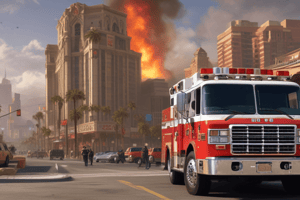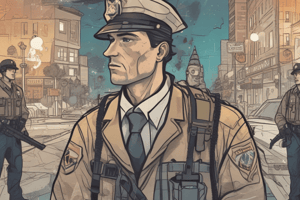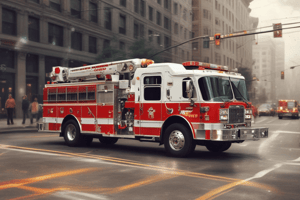Podcast
Questions and Answers
What is the best approach when facing someone who self-injures?
What is the best approach when facing someone who self-injures?
- Engage in a life-threatening crisis intervention
- Use guilt, shame, or put-downs
- Present with a low-key, dispassionate demeanor (correct)
- Respond negatively to increase their anxiety
Which statement best describes suicide according to the text?
Which statement best describes suicide according to the text?
- Suicide is a temporary problem
- Suicide is an action, not an illness (correct)
- Suicide is a mental illness
- Suicide is caused by biochemical disturbances in the brain
What are some behavioral indicators of suicide threat mentioned in the text?
What are some behavioral indicators of suicide threat mentioned in the text?
- Giving away personal property or belongings (correct)
- Indulging in social interactions
- Enhanced personal hygiene
- Engaging in excessive physical activity
How does stress impact one's coping ability according to the text?
How does stress impact one's coping ability according to the text?
What percentage of Canadians will experience mental illness in their lifetime, based on the text?
What percentage of Canadians will experience mental illness in their lifetime, based on the text?
What is the purpose of critical incident stress management?
What is the purpose of critical incident stress management?
Which type of event falls under the category of critical incidents?
Which type of event falls under the category of critical incidents?
What is the main purpose of Critical Incident Stress Management (CISM)?
What is the main purpose of Critical Incident Stress Management (CISM)?
What is a common reason individuals engage in self-injury according to the text?
What is a common reason individuals engage in self-injury according to the text?
What does the Self Injury Process primarily involve according to the text?
What does the Self Injury Process primarily involve according to the text?
Why is Critical Incident Stress Management (CISM) conducted in a safe and effective environment?
Why is Critical Incident Stress Management (CISM) conducted in a safe and effective environment?
What is the main objective of debriefing techniques like Critical Incident Stress Management (CISM)?
What is the main objective of debriefing techniques like Critical Incident Stress Management (CISM)?
What is the primary focus of the current criminal justice system?
What is the primary focus of the current criminal justice system?
In restorative justice, what role do victims play in the process?
In restorative justice, what role do victims play in the process?
What is a common criticism leveled against restorative justice?
What is a common criticism leveled against restorative justice?
What is the primary philosophy of Crisis Prevention Institute (CPI)?
What is the primary philosophy of Crisis Prevention Institute (CPI)?
Which type of debriefing supports the healing of emotional impact following a traumatic incident?
Which type of debriefing supports the healing of emotional impact following a traumatic incident?
What is the purpose of Critical Incident Operational Stress Management Debriefing (CISM)?
What is the purpose of Critical Incident Operational Stress Management Debriefing (CISM)?
Flashcards are hidden until you start studying
Study Notes
Critical Incident Stress Management (CISM)
- Designed for first responders of a disaster or traumatic event
- Very structured and organized process
- Time sensitive debriefing done in a safe and effective environment
- Uses trained CISM members
- Confidential
Critical Incidents
- Any death
- Hostage taking
- Witnessing or being involved in an event that is beyond the realm of the normal human experience
- Serious violent act or event
- Any incident that causes a severe emotional reaction
Self-Injury
- A normal reaction to an abnormal event
- Serves as a distraction and is seen as the only way to get relief from emotional pain
- Releases beta-endorphins which create pleasurable feelings
- Physically and emotionally calming
- Provides validation that the person is in control
The Self-Injury Process
- Thinking Phase: Caused by a significant trigger event that activates flashback to the past and negative appraisals
Restorative Justice
- Asserts that victims are forgotten in the current justice system and should have a greater role and a voice in determining the outcome of their case
- Principles:
- Those affected directly by the crime come together to discuss the crime and its impact on their lives
- Wrongdoers recognize the harm they have caused and accept responsibility for their actions
- Wrongdoers make reparation to the victims and the community
- Focus is on problem-solving, making things right, and the restoration of balance and harmony
Critics of Restorative Justice
- Perception it is being ‘soft on crime’ or ‘an easy way to avoid prison’
- Danger that victims and offenders may feel pressured into taking part and participating in RJ
- Not all victims wish to participate, especially those of violent offences
- Not all offenders are remorseful for their actions
CPI Crisis Prevention Institute
- Philosophy: “Care, welfare, safety, and security”
- Non-violent crisis intervention strategies
Types of Debriefing
- Critical Incident Operational Stress Management Debriefing (CISM): Supports the healing of the emotional impact following a traumatic incident or event
- Provides education on the effects of stress
Approaching Self-Injury
- When facing someone who self-injures, the best approach is to:
- Remind yourself that self-injury is a alarming behavior, not a life-threatening crisis
- Present with a low-key, dispassionate demeanor
- Not respond negatively to the person, as it just increases their anxiety and distress
- Not use guilt, shame, or put-downs
Suicide Awareness
- Suicide is a self-inflicted behavior that is intended to bring about one’s own death in the shortest term
- Suicide is an action, not an illness
- It is a permanent solution to a temporary problem
- Behavioural Indicators of Suicide:
- Threatening, discussing or asking about suicide
- Sleep disorders (too much or too little)
- Change in activity level
- Withdrawn
- Physically unkempt or neglecting personal hygiene
- Giving away personal property or belongings
- Putting affairs in order
Mental Health Problems
- It’s natural to feel off balance at times, but it may become a problem if it impacts one’s daily life over a period of time
- Stress can affect how one copes with life’s day-to-day activities
- Can take on different shapes and forms at different times
- Causes include:
- Biochemical disturbances in the brain
- Psychological factors
- Emotional trauma
- Social factors
- Environmental factors
- Mental Health Facts:
- 1 in 5 Canadians will experience mental illness in their lifetime
Studying That Suits You
Use AI to generate personalized quizzes and flashcards to suit your learning preferences.




